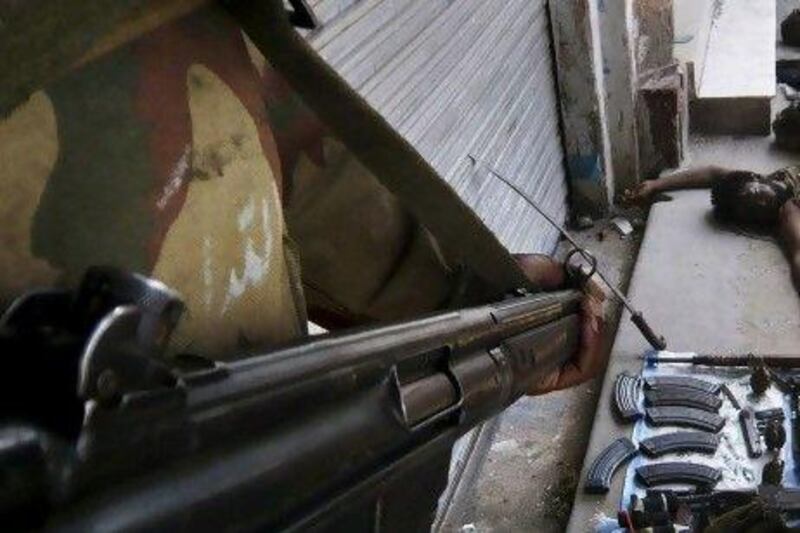ISLAMABAD // The footage was startling: a group of what appeared to be Pakistani soldiers gunning down several blindfolded men in a forested area. As the clips circulated online and the United States threatened to cut aid, Pakistan's army chief promised a full investigation and punishment for those responsible.
But two years later, answers remain elusive.
The army will not say what the inquiry found, nor if anyone was punished. Some rights activists question whether an investigation took place.
Pakistan has spent nearly five years under civilian rule, an unusually long stretch for a 65-year-old country prone to military coups. But as the firing squad footage and several other prominent scandals suggest, the army remains largely unwilling to hold itself accountable to the public. This despite some pressure from more active media and judiciary and despite hopes that the military would rethink its ways after the humiliation it suffered following the unilateral US raid that killed Osama bin Laden.
The army's lack of transparency and resistance to civilian oversight could cripple Pakistan's transition to a healthy democracy, something the US has said the country needs. But the Americans cannot protest too much. Washington needs the Pakistani army's cooperation as the war in Afghanistan winds down, and it already struggles to balance a strained relationship as it presses the army to root out anti-US insurgents hiding in Pakistan.
"It's important to understand that generally the Pakistani military is very careful about not hurting its own people," especially as they fight Islamists trying to overthrow the state, said Ayesha Siddiqa, a prominent Pakistani defence analyst. Most ordinary Pakistanis feel powerless to take on the army, and when it comes to reining in the men in uniform, the still-weak civilian government "can't do anything", she said.
The two video clips that led to the supposed inquiry fuelled allegations that the military carried out numerous extrajudicial killings in the Swat Valley during a major offensive against the Pakistani Taliban in 2009. Bloodied corpses of suspected militants were found dumped on the streets for months after the army retook the valley from the Taliban. The army denied those killings.
The footage, which came to light in September 2010, is believed to have been recorded in Swat. A nearly six-minute clip shows men in Pakistani military uniforms lining up six blindfolded men in civilian clothes, then shooting them. After a voice says "finish them one by one", one apparent soldier walks over to the men and shoots them again. The other, 53-second clip shows only the executions.
On October 8, 2010, the army chief, Gen Ashfaq Parvez Kayani, announced an inquiry into the matter. He noted the investigation would consider if the footage was real, but also said: "It is not expected of a professional army to engage in excesses against the people whom it is trying to guard against the scourge of terrorism."
In the two years since, there has been little information on the inquiry.
The US, meanwhile, is legally bound to cut aid to foreign military units that violate human rights, and US officials have said the execution clips prompted a cut-off of funding to several Pakistani army units whose identities are classified.
That does not mean net funding for Pakistan goes down. The money can simply be shifted to other Pakistani units. The nuclear-armed country is of such strategic importance that US leaders say it is difficult to withhold funds. In total, Pakistan receives about US$1 billion (Dh3.6bn) in economic aid and $1bn in military assistance annually.
Ali Dayan Hasan, the head of Human Rights Watch in Pakistan, is not convinced the military investigated the incident.
Still, a more assertive judiciary and a more technologically advanced media landscape are bringing signs of change.
In August last year, an antiterror court sentenced to death a soldier who shot and killed an unarmed youth as he begged for mercy in Karachi. The incident was caught on videotape and repeatedly broadcast by TV stations, triggering enough public anger to ensure the military could not ignore it.
In January, a government-appointed commission released a report on the death of the Pakistani journalist, Saleem Shahzad, who was killed after telling friends he was threatened by the country's premier intelligence agency.
The judiciary has also increasingly demanded the army and intelligence agencies account for suspects allegedly held in secret, believed to number in the thousands. Some have even been freed due to the court's demands.
Protests by victims' relatives helped push for the release of some of the missing, said Mr Hasan.





